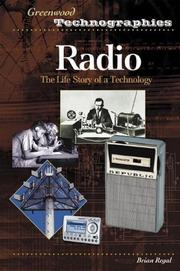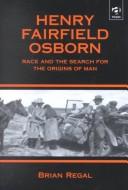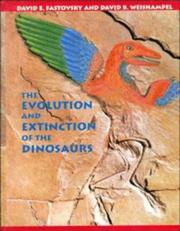| Listing 1 - 6 of 6 |
Sort by
|

ISBN: 0313331677 Year: 2005 Publisher: Westport, Conn. Greenwood Press
Abstract | Keywords | Export | Availability | Bookmark
 Loading...
Loading...Choose an application
- Reference Manager
- EndNote
- RefWorks (Direct export to RefWorks)
Mass communications --- Radio --- History.
Book
ISBN: 3030995372 3030995380 Year: 2022 Publisher: Cham, Switzerland : Palgrave Macmillan,
Abstract | Keywords | Export | Availability | Bookmark
 Loading...
Loading...Choose an application
- Reference Manager
- EndNote
- RefWorks (Direct export to RefWorks)
This book examines the legends of who 'really' discovered America. It argues that histories of America's origins were always based less on empirical evidence and more on social, political, and cultural wish fulfillment. Influenced by a complex interplay of Nativist hatred of immigrants and Aboriginal people, as well as distrust of academic scholarship, these legends ebbed and flowed with changing conditions in wider American society. The book focuses on the actions of a collection of quirky, obsessed amateur investigators who spent their lives trying to prove their various theories by promoting Welsh princes, Vikings, Chinese admirals, Neo-lithic Europeans, African explorers, and others who they say arrived centuries before Columbus. These myths acted as mitigating agencies for those who embraced them. Along with recent scholarship, this book makes extensive use of archival materials -- some of which have never been employed before. It covers the period from the sixteenth century to the present. It brings together separate historiographic ideas to create a unified history rather than focusing on one particular legend as most books on the subject do. It shows how questions of who discovered America helped create the field of historical scholarship in this country. This book does not attempt to prove who discovered America, rather it tells the story of those who think they did. Brian Regal is Associate Professor of history at Kean University, USA.
America --- Discovery and exploration --- Historiography. --- History. --- Discovery and exploration.
Book
ISBN: 9783030995386 9783030995379 9783030995393 9783030995409 3030995380 Year: 2022 Publisher: Cham : Springer International Publishing : Imprint: Palgrave Macmillan,
Abstract | Keywords | Export | Availability | Bookmark
 Loading...
Loading...Choose an application
- Reference Manager
- EndNote
- RefWorks (Direct export to RefWorks)
This book examines the legends of who 'really' discovered America. It argues that histories of America's origins were always based less on empirical evidence and more on social, political, and cultural wish fulfillment. Influenced by a complex interplay of Nativist hatred of immigrants and Aboriginal people, as well as distrust of academic scholarship, these legends ebbed and flowed with changing conditions in wider American society. The book focuses on the actions of a collection of quirky, obsessed amateur investigators who spent their lives trying to prove their various theories by promoting Welsh princes, Vikings, Chinese admirals, Neo-lithic Europeans, African explorers, and others who they say arrived centuries before Columbus. These myths acted as mitigating agencies for those who embraced them. Along with recent scholarship, this book makes extensive use of archival materials-some of which have never been employed before. It covers the period fromthe sixteenth century to the present. It brings together separate historiographic ideas to create a unified history rather than focusing on one particular legend as most books on the subject do. It shows how questions of who discovered America helped create the field of historical scholarship in this country. This book does not attempt to prove who discovered America, rather it tells the story of those who think they did. Brian Regal is Associate Professor of history at Kean University, USA.
History as a science --- History of civilization --- History --- History of North America --- History of Latin America --- historiografie --- cultuurgeschiedenis --- geschiedenis --- America --- Historiography. --- International relations --- Civilization --- History of the Americas. --- Historiography and Method. --- Diplomatic and International History. --- Cultural History. --- History. --- Methodology.
Digital
ISBN: 9783030995386 9783030995379 9783030995393 9783030995409 Year: 2022 Publisher: Cham Springer International Publishing, Imprint: Palgrave Macmillan
Abstract | Keywords | Export | Availability | Bookmark
 Loading...
Loading...Choose an application
- Reference Manager
- EndNote
- RefWorks (Direct export to RefWorks)
This book examines the legends of who 'really' discovered America. It argues that histories of America's origins were always based less on empirical evidence and more on social, political, and cultural wish fulfillment. Influenced by a complex interplay of Nativist hatred of immigrants and Aboriginal people, as well as distrust of academic scholarship, these legends ebbed and flowed with changing conditions in wider American society. The book focuses on the actions of a collection of quirky, obsessed amateur investigators who spent their lives trying to prove their various theories by promoting Welsh princes, Vikings, Chinese admirals, Neo-lithic Europeans, African explorers, and others who they say arrived centuries before Columbus. These myths acted as mitigating agencies for those who embraced them. Along with recent scholarship, this book makes extensive use of archival materials-some of which have never been employed before. It covers the period from the sixteenth century to the present. It brings together separate historiographic ideas to create a unified history rather than focusing on one particular legend as most books on the subject do. It shows how questions of who discovered America helped create the field of historical scholarship in this country. This book does not attempt to prove who discovered America, rather it tells the story of those who think they did. Brian Regal is Associate Professor of history at Kean University, USA.
History as a science --- History of civilization --- History --- History of North America --- History of Latin America --- historiografie --- cultuurgeschiedenis --- geschiedenis --- America

ISBN: 0754605876 Year: 2002 Publisher: Aldershot Ashgate
Abstract | Keywords | Export | Availability | Bookmark
 Loading...
Loading...Choose an application
- Reference Manager
- EndNote
- RefWorks (Direct export to RefWorks)
Eugenics --- Human beings --- Human evolution --- Paleontologists --- Physical anthropology --- Racism in anthropology --- Religious fundamentalism --- History --- Origin --- Philosophy --- Religious aspects --- Christianity --- Osborn, Henry Fairfield, --- Scopes, John Thomas --- Trials, litigation, etc.

ISBN: 0521444969 9780521444965 Year: 1996 Publisher: Cambridge: Cambridge university press,
Abstract | Keywords | Export | Availability | Bookmark
 Loading...
Loading...Choose an application
- Reference Manager
- EndNote
- RefWorks (Direct export to RefWorks)
Evolution. Phylogeny --- Vertebrates --- Dinosaurs --- Extinction (Biology) --- Evolution --- Dinosaurs - Evolution
| Listing 1 - 6 of 6 |
Sort by
|

 Search
Search Feedback
Feedback About UniCat
About UniCat  Help
Help News
News